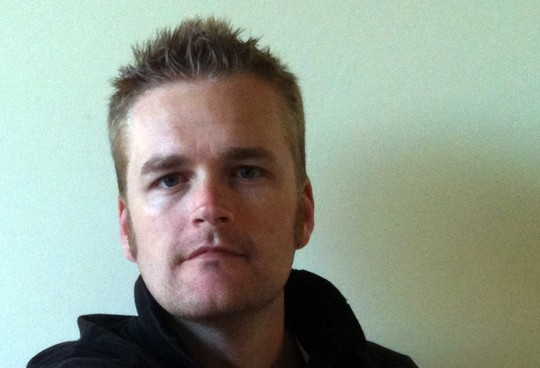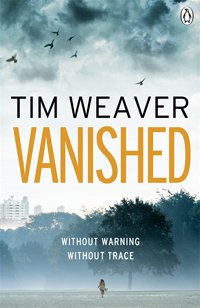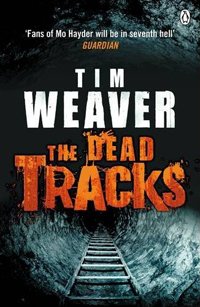 Back when we started Crime Ficiton Lover, one of the first books we got in to review was The Dead Tracks by Tim Weaver. I wanted to read that one because Tim and I used to work for the same company and I thought it was great that in addition to his computer game journalism he’s become a successful crime author. He’s a bright guy who goes around with a smile on his face, so it was a little surprising to discover what dark things he writes about. Vanished, his new release, is with us and like The Dead Tracks it sees missing persons investigator David Raker caught up in an intriguing case. So at last we have the chance to interview Tim Weaver…
Back when we started Crime Ficiton Lover, one of the first books we got in to review was The Dead Tracks by Tim Weaver. I wanted to read that one because Tim and I used to work for the same company and I thought it was great that in addition to his computer game journalism he’s become a successful crime author. He’s a bright guy who goes around with a smile on his face, so it was a little surprising to discover what dark things he writes about. Vanished, his new release, is with us and like The Dead Tracks it sees missing persons investigator David Raker caught up in an intriguing case. So at last we have the chance to interview Tim Weaver…
First off, tell us a bit about Vanished.
At the heart of Vanished is the disappearance of Sam Wren who, on his regular morning commute, gets onto a Tube train and never gets off again. There’s no trace of him anywhere – no eyewitnesses, nothing on security camera, literally no sign that he ever got off the train. So where did he go? After six months and no answers, Sam’s wife Julia hires missing persons investigator David Raker to find out.
But isn’t the Underground one of the most CCTV-ed up environments in the world?
I suppose all my books, to a greater or lesser extent, have been spins on the locked room mystery, but Vanished is probably the most overt. How does a man disappear from inside a Tube train? There’s no way off, the train isn’t stopping between stations, and – as you say – the London Underground platforms, concourses and walkways are watched over by about 8,500 cameras. That’s a lot of eyeballs!
 It was a deliberate challenge, though – to myself, and to the reader. As a writer, I don’t want to be hitting the same beats, book after book. I don’t want to feel like I’ve hit some sort of comfort zone after only three novels. Part of the challenge of Vanished was to build a world that felt accurate and believable, to present this apparently impossible scenario to the reader, and to deliver a book that kept me and, more importantly, the readers guessing. A by-product of that is that Raker and the secondary series characaters develop naturally. If you take yourself out of your comfort zone, they come with you, and they evolve in interesting ways.
It was a deliberate challenge, though – to myself, and to the reader. As a writer, I don’t want to be hitting the same beats, book after book. I don’t want to feel like I’ve hit some sort of comfort zone after only three novels. Part of the challenge of Vanished was to build a world that felt accurate and believable, to present this apparently impossible scenario to the reader, and to deliver a book that kept me and, more importantly, the readers guessing. A by-product of that is that Raker and the secondary series characaters develop naturally. If you take yourself out of your comfort zone, they come with you, and they evolve in interesting ways.
How does David Raker face the challenge and where does it take him?
The book explores some of the amazing history of the Tube, so it’s not hard to imagine that Raker ends up in some – literally and figuratively – fairly dark places. Lots of your readers will, I’m sure, already be familiar with London’s ghost stations, these sprawling, strangely beautiful and remarkably creepy abandoned Underground stations that sit beneath the pavements of the city, untouched and unused – they form the focal point for several key sections in the book.
The challenge for Raker himself comes from all sides. He’s challenged by the case, by the stubborness of the police, by his old sparring partner, Colm Healy, and by the relationship he’s started with his next door neighbour. It was referenced towards the end of The Dead Tracks, actually, but in Vanished Raker starts to develop a deeper connection to the missing, believing that he has some unwritten responsibility to them. Much of that is borne out of the loss he still feels for his wife.
 You set your books in London but you’re not a Londoner and don’t live there. What attracts you about that setting?
You set your books in London but you’re not a Londoner and don’t live there. What attracts you about that setting?
I’ve never lived in London, but I’ve spent a lot of my working life there, so it doesn’t feel like too much of a stretch. I like the size and scope of the city. It’s big and diverse and, at times, quite intimidating, and there’s so much texture to it: to the people, to their beliefs, to the circles they move in and the places they live. It’s a great canvas on which to paint these characters and stories. But I don’t feel bound to London. In fact, in the follow-up to Vanished, I shift things away from the city a little. I think it’s important to keep things fresh, especially when you’re writing a series.
Many crime books focus on murder, serial killers and, lately, human trafficking. What is it you love about writing about missing persons cases?
I just became very interested in the idea of a person going missing in an age where we have CCTV on every street, 24-hour rolling news channels, and constant access to cameras through our phones. It seemed like an intriguing starting point for a book.
It sounds trite, but I was also struck by the human cost. Can you imagine how many stories must go untold when a person vanishes – why they left, if they left of their own accord, where they went, what happened to them, why they never came home again? Or how the families left behind feel, wondering if their loved one will ever reappear? Raker’s history of loss – a history I’d put in place before I really set him out along the path to missing persons – ran in parallel with those emotions, so it felt like a good fit.
What’s next for you?
Next is Book 4! My submission deadline is end of September so I’m working hard on finishing that. It’s something a bit different that’s taken me even further out of my comfort zone than Vanished did, but I’m looking forward to seeing what my agent and editor make of it. Unless they absolutely hate it, of course!








